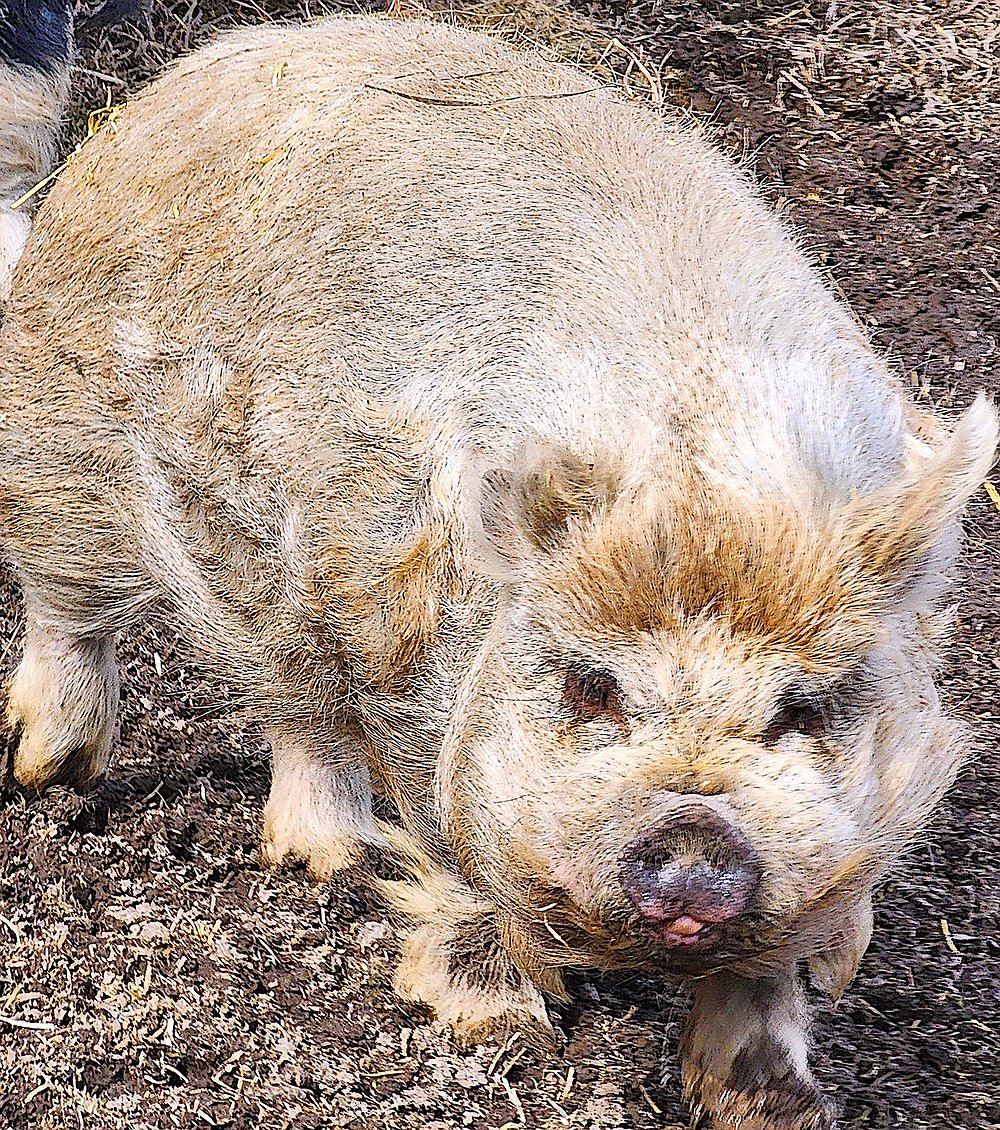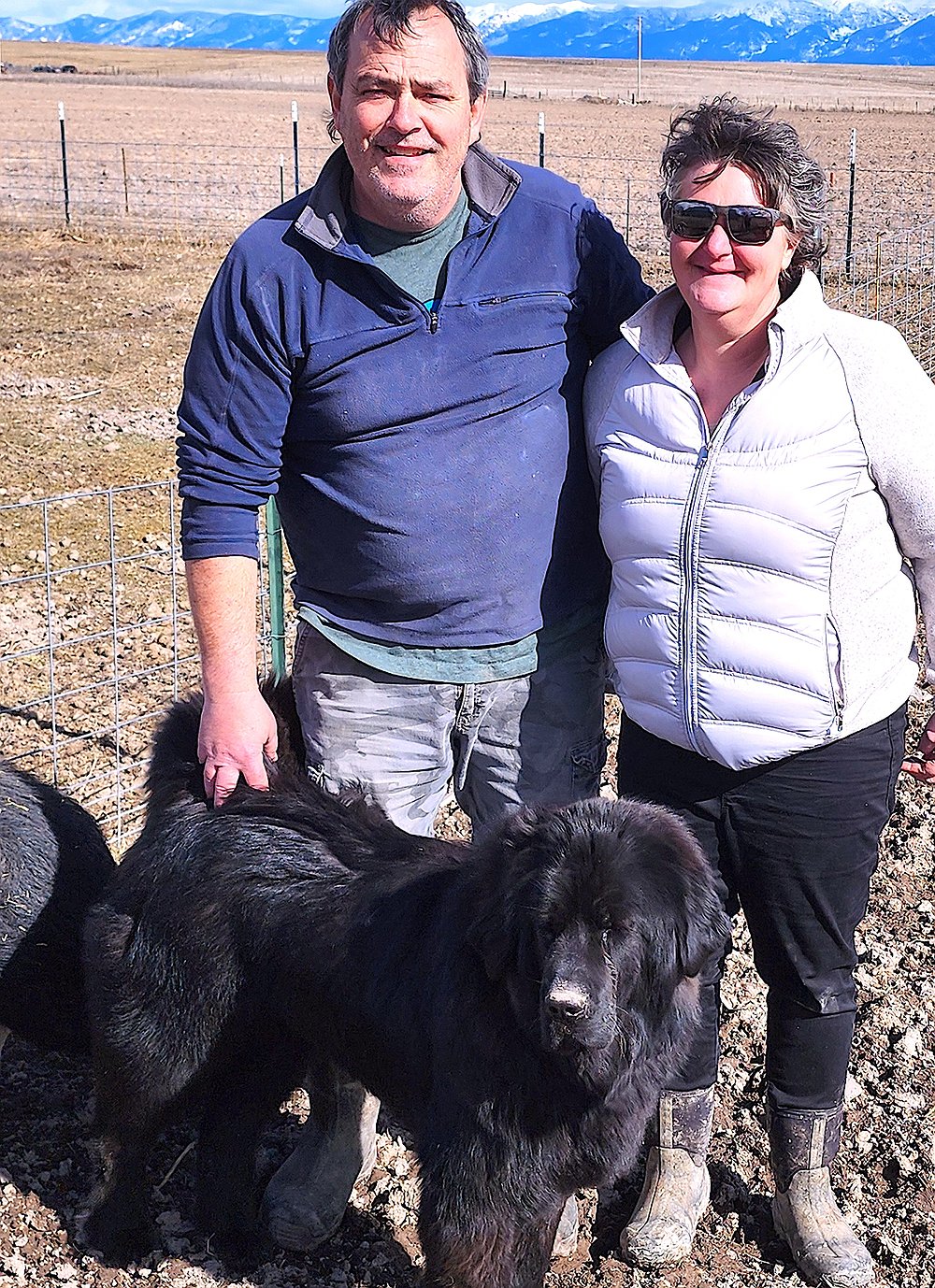Kunekune: Round Butte couple raises affable pigs
BERL TISKUS | Hagadone News Network | UPDATED 1 year, 10 months AGO
Reporter Berl Tiskus joined the Lake County Leader team in early March 2023, and covers Ronan City Council, schools, ag and business. Berl grew up on a ranch in Wyoming and earned a degree in English education from MSU-Billings and a degree in elementary education from the University of Montana. Since moving to Polson three decades ago, she’s worked as a substitute teacher, a reporter for the Valley Journal and a secretary for Lake County Extension. Contact her at [email protected] or 406-883-4343. | March 14, 2024 12:00 AM
Kunekune (pronounced KOOnee KOOnee) sows and gilts bask in the sunshine or nibble on the remnants of their morning hay.
On the other side of the fence, the Kunekune “boys” explore any plant life and hang out, some napping in the sun while Margie the Tibetan Mastiff keeps an eye out for coyotes and other predators.
These quirky pigs live on Brett and Emily Peterson’s Round Butte Kunekune Ranch west of Ronan. A New Zealand breed, their name means “short” and “fat” in Maori.
The Petersons’ adopted “a homestead lifestyle” – raising and growing their own food – after their daughter was diagnosed with Type 2 diabetes. As well as a garden, they initially raised chickens for meat and then added rabbits to the mix. But their children wouldn’t eat rabbit meat and recipes were scarce. So they thought about pigs.
Her husband began to research swine breeds, even though Emily’s father had told horror stories about independent and ornery hogs.
His research revealed that Kunekunes are the only truly grazing pigs, and can survive on grass and forage. They also like vegetables and fruit.
A heritage swine breed, Kunekunes are smaller than most pigs, calm and friendly, and aren’t prone to rooting. (People who’ve lost their gardens to rooting hogs know about that swinely habit.)
With well-marbled meat and intramuscular fat, Kunekune meat is succulent and tender. Also they’re known to produce high quality lard that’s great for making sausage. The meat is red as opposed to most pork, which is white.
Diving headfirst into pigdom
Emily “dove into Kunekunes head first.” With their dished faces and turned up snouts, friendly expressions, and dense, hairy coats, Kunekunes have a personable demeanor. They can be ginger, cream, spotted, black or brown. They also have a wattle, or “piri piri” in Maori, hanging on each side of their lower jaw.
“They’re about the size of water bottles when they’re born,” Emily said,” and they’re born hairy.”
A funny story about the furry Kunekunes came about when the Petersons had rented a truck and were outside of Rigby, Idaho, headed home to Washington. Brett was driving slowly, he said, since they had three full-size Kunekunes, two litters, and their breeding boar – a big hairy fella named Jackson – in the truck. Jackson was in a two-by-four pen on the tailgate, fast asleep.
Brett said cars would come speeding up the interstate to pass him when their headlights would illuminate Jackson’s furry back. He said you could almost see the drivers saying, “What in the heck is that in that truck?”
Cars were slowing down and pulling in behind the Petersons. One person even flicked his brights on to get a better look at Jackson.
“He looked like a big brown bear we just picked up off the road,” Emily said, laughing. “Or maybe a sasquatch.”
The Petersons lived in Washington state when they began their pig project with crossbreds, then they found purebred registered stock. At one time they had about 100 pigs.
Emily took the troops to Chico, Calif., in the winter time to show them.
When they moved to Montana in 2021 during COVID the Petersons scaled down their herd.
“Kunekunes are warm blooded so they really like (Montana) winters,” Brett said. “Sometimes they get too hot in the summer.”
When it gets really cold, Emily said they spread barley straw in the shelters and put a tarp over the pigs with water nipples and a defroster to keep them hydrated.
Rhubarb and Rustic Gravy are two of the Kunekune sows who are expecting litters of piglets in May. Gestation is 116 days for the girls. Their lineage demands that their names begin with an “r.”
The Peterson’s breeding boar is Meatball, and his son, who’s also headed for the breeding shed, will be named Meathead.
The couple have a building designed for meat processing, with large coolers, workbenches, etc. Even though it’s hard, since they’ve been around their Kunekunes since they were piglets, Brett and Emily make sure their pigs have happy, healthy lives and a quick ending.
Although Kunekunes are very docile and friendly, Brett and Emily don’t believe in making them pets. It’s their goal to thank the pig and to use every part of its body.
Recently they made sausage, and Emily canned most of it. They also cure bacon and enjoy all the usual cuts.
Drive by the Round Butte Kunekune Ranch sometime, and watch the pigs graze, interact, and live their lives.
ARTICLES BY BERL TISKUS

Upgrades continue at Ronan Community Center
The Community Center in Ronan was dedicated in 1969, after untold months of work by the local Jaycees and Jayceens. “It’s been a very long time since it had an upgrade, just because there’s no money,” said Sjaan Vincent, Ronan fairgrounds manager.

City of Ronan welcomes Mark Nelson to council
Ronan City Council’s meeting on Jan. 14 began with a welcome for a new council member and new police officer, plus new office worker Gwen Zolder.

Winterfest draws crowd but no snow
It was about 40 degrees with not a tablespoon of snow on the ground at the Miracle of America Museum in Polson on Jan. 10. Despite the balmy temperature, people gathered for the annual Winterfest, and examined the fleet of vintage snowmobiles on the museum’s front lawn.





